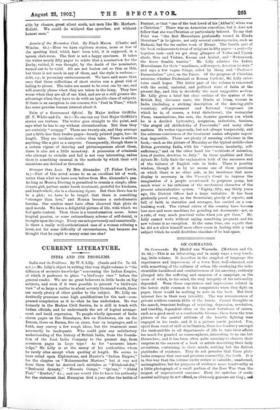CURRENT LITER...AT URE.
INDIA AND ITS PROBLEMS.
India and its Problems. By W. S. Lilly. (Sands and Co. 7s. 6d. net.)—Mr. Lilly's object in writing this very slight volume is " the diffusion of accurate knowledge" concerning the Indian Empire, of which it professes to place " a bird's-eye view " before the general reader. We are no great believers in little books on big subjects, and even if it were possible to present "a bird's-eye view " of so large a matter in about seventy thousand words, there are surely plenty of other guides to the subject. Mr. Lilly un- doubtedly possesses some high qualifications for the task—com- pressed compilation as it is—that he has undertaken. He was formerly in the Madras Civil Service, he is still in touch with Indian officials, and he understands the art of logical arrange- ment and lucid expression. To people wholly ignorant of India eleven pages on the Himalayas, five on Hindustan, six on the Deccan, three on Burma, five on races, four on languages, and so forth, may convey a few rough ideas, but the treatment must necessarily be inadequate. Who could gain any satisfactory understanding of the history of British India, from the founda- tion of the East India Company to the present day, from seventeen pages in large type ? As for "accurate know- ledge," Mr. Lilly is at the mercy of his authorities, whom he rarely cites except when quoting at length. He seems to have relied upon Elphinstone, and Hunter's "Indian Empire," for the chapter on " Mohammedan Masters," but it was not from them that he derived such mistakes as " Kittab-ud-din," " Brahmini dynasty," " Hussain Gauge," " Qu'ran," " Abdul Fazl," "Kushru," dec. ; and one would like to know his authority for thei statement that Humayun died a year after the battle of Panipat, or that "one of the best loved of his [A.kbar's] wives was a Christian." There was an Armenian concubine, but it does not follow that she was Christian or particularly beloved. To say that Feizi was "the first Mussulman profoundly versed in Hindu literature" is to ignore, not only several contemporaries, such as Badaoni, but the far earlier work of Biruni. The fourth part of the book endeavours to treat of religions in fifty pages—a perfectly hopeless task—and we get stray glimpses of Vedas and Upani. shads, Siva and Vishnu, Karma and Arahat, and " Mohammed, the fierce Semitic warrior." Mr. Lilly admires the Indian Mussulmans for their "manliness, self-respect, devotion to duty," and says a few vague things, aided by Haug and " Professor Darmestetter " (sic), on the Parsis. Of the progress of Christian missions, whether Protestant or Roman Catholic, Mr. Lilly enter- tains small hopes. The latter part of the volume is concerned with the social, material, and political state of India at the present day, and this is decidedly the most suggestive section. Mr. Lilly gives a brief but clear outline of the system of the British Raj, discusses caste, the Hindu at home, woman in India (including a striking description of the dancing-girl's vocation), self-government and National Congresses (in which he is, of course, a total disbeliever), the vernacular Press, examinations, fine arts, the frontier question (on which he is a decided Lyttonite), irrigation, industries, famines, "the stupid old shibboleths of Free-trade," and many other matters. He writes vigorously, but not always temperately, and the extreme conciseness of the treatment snakes adequate exposi- tion impossible. There are plenty of amusing criticisms in the book,—such as the picture of Macaulay as the typical middle-class Briton governing India, with his " narrowness, insularity, self- sufficiency," and on the other hand his " rectitude of intention, love of justice, devotion to duty." In these qualities and their difauts Mr. Lilly finds the explanation both of the successes and of the failures of English rule in India. There is possibly wisdom, though it is by no means one of those questions on which there is no other side, in his insistence that more display is necessary in the Viceroy's Court to impress the imagination of a people accustomed to gorgeous pomp, but much wiser is his criticism of the mechanical character of the present administrative system. " Eighty, fifty, nay thirty years ago, the District Officer had a large initiative. It has been gradually pared away, as the Secretariat, greedy of reports, and full of faith in statistics and averages, has carried on a cen- tralising work. The virtual rulers of the country have become less men and more machines for grinding out documents—not, as a rule, of very much practical value when you get them." Mr. Lilly, cannot write without saying something pregnant, and his new volume is no exception. At the 'same time, one regrets that he did not allow himself more elbow-room in dealing with a vast subject which he could doubtless elucidate if he had space.






































 Previous page
Previous page